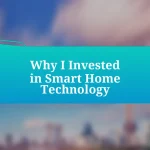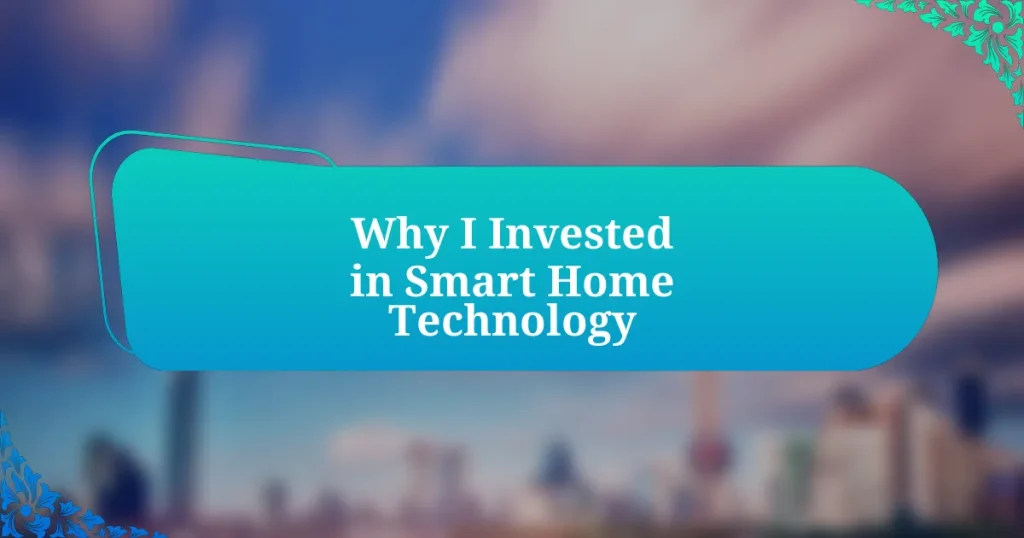Key takeaways:
- Smart City Technology enhances urban life through real-time data integration for improved efficiency and sustainability.
- Smart Home Technology significantly improves daily living by offering energy savings, increased safety, and automation of routine tasks.
- Investing in smart devices requires careful consideration of lifestyle needs, budget, and user-friendliness to avoid complications.
- The future of smart home technology promises greater connectivity and AI integration, making homes more intuitive and responsive to individual needs.
Author: Clara Whitfield
Bio: Clara Whitfield is an acclaimed contemporary author known for her poignant storytelling and evocative prose. With a background in psychology, she intricately weaves themes of human emotion and personal growth into her narratives. Clara’s debut novel, The Echoes of Yesterday, received critical acclaim and garnered her a loyal readership. When she’s not writing, Clara enjoys exploring nature and visiting local coffee shops, where she often draws inspiration for her next story. She currently resides in Portland, Oregon, with her two rescue dogs.
Understanding Smart City Technology
Smart City Technology is all about using digital tools and data to create more efficient, livable urban environments. I remember the first time I walked through a city that utilized real-time traffic monitoring; it was astounding to see how the lights adjusted and traffic flowed more smoothly. Isn’t it amazing to think how technology can literally change the way we navigate our daily lives?
At its core, Smart City Technology integrates various systems—like energy management, transportation, and public safety—into a cohesive framework that enhances quality of life. I often reflect on how these interconnected systems can lead to not just convenience, but also sustainability. Wouldn’t it be fulfilling to live in a city where environmental impact is curbed as a part of our daily routines?
Understanding Smart City Technology involves grasping its potential to collect vast amounts of data to inform decision-making. I still recall a community meeting where local leaders discussed how sensor data helped them identify the best locations for new parks. It was a beautiful moment, showcasing community engagement fueled by technology—proof that Smart Cities can empower citizens to shape their environments actively.
Importance of Smart Home Technology
The importance of Smart Home Technology can’t be overstated when we consider its impact on daily living. Personally, my experience with smart devices has transformed how I manage my household. It’s remarkable to think about how simply adjusting the thermostat while lying comfortably on my couch can enhance my energy efficiency and overall comfort.
Moreover, Smart Home Technology plays a significant role in safety and security. I remember the first time I used my doorbell camera; it provided a sense of peace I hadn’t anticipated. Knowing I can see who’s at my door from anywhere gives me an added layer of reassurance. Encountering such moments makes me appreciate the comforting presence of technology in our lives.
Lastly, the ability to automate mundane tasks is a game changer. For instance, my smart speaker reminds me of important appointments and even controls my lights at set times, creating an effortless daily routine. Isn’t it fascinating how these small innovations can free up time for the things we truly enjoy?
Advantages of Smart Home Investments
When I decided to invest in smart home technology, one of the first benefits I noticed was the cost savings on my energy bills. For example, my smart thermostat learned my daily patterns and adjusted temperatures accordingly, which significantly reduced my energy consumption. It felt rewarding to see those monthly savings add up, knowing I was also doing my part for the environment.
Another major advantage is the heightened convenience smart devices offer. I recall a particularly hectic week when my smart lighting system saved me from tripping in the dark after a long day. With just a voice command, I could illuminate the entire living room without needing to fumble for a switch. Doesn’t that just make life easier?
Lastly, the integration of smart home devices fosters a sense of control that I never fully appreciated until I experienced it firsthand. When I’m away, I can monitor my home security through my smartphone, providing a peace of mind that’s hard to put into words. Isn’t it comforting to know that technology allows us to stay connected, even when we’re physically distant?
Factors Influencing Smart Home Choices
When it came to choosing smart home technology, my lifestyle and personal needs were paramount factors. For instance, with a growing family, I found myself increasingly concerned about home safety. This focus led me to invest in smart cameras and security systems, which not only provide alerts but also allow me to keep an eye on my kids from anywhere. Doesn’t having that reassurance make a significant difference in daily life?
Budget is another crucial element that influenced my choices. Initially, I hesitated when I saw the price tags associated with some gadgets. However, I realized that not all smart home devices break the bank. My smart plugs, for instance, were relatively inexpensive yet still offered significant energy savings and convenience. It’s interesting how sometimes, the most straightforward solutions can make a big impact without requiring a huge investment.
Finally, user-friendliness played a huge role in my decision-making process. I distinctly remember the frustration of my first smart device, which had a complex setup that seemed daunting. I ultimately gravitated towards brands that emphasized simple installation and intuitive apps. Have you ever felt lost trying to connect a device? Trust me, finding products that prioritize user experience can transform the smart home journey from overwhelming to truly enjoyable.
Lessons Learned from My Investments
Investing in smart home technology taught me the importance of thorough research before purchasing. I vividly recall my excitement when I bought a smart thermostat, only to discover it wasn’t compatible with my heating system. That experience underscored the value of checking compatibility and features first, saving both time and money. Have you ever jumped into a purchase only to face unexpected complications?
I also learned that experimenting can yield surprisingly positive results. One day, on a whim, I decided to try out a smart lighting system, and it completely changed the ambiance of my home. The ability to adjust the lighting remotely, or set automated schedules, brought a level of comfort I hadn’t anticipated. It’s fascinating how a simple tweak can enhance the overall living experience—what small changes have you made to elevate your home?
Lastly, I discovered that creating a cohesive smart home ecosystem is far more rewarding than simply acquiring devices. In my early days, I had a mix of brands that didn’t communicate well with each other, leading to frustration. Once I transitioned to a more integrated system, everything flowed seamlessly, making daily routines easier and more efficient. Isn’t it remarkable how connectivity can transform our interactions with technology?
Future of Smart Home Technology
As I look toward the future of smart home technology, I can’t help but feel a sense of excitement about the increasing connectivity and automation that will shape our daily lives. Imagine walking into your home, and it automatically adjusts to your preferred settings—lighting, temperature, and even your favorite music playing softly in the background. This isn’t just a dream; it’s a glimpse into what smart homes can truly offer.
Moreover, the potential for enhanced security features is incredibly appealing. I remember a time when I was away on vacation, worrying about the safety of my home. What if smart home technology could alert me to any unusual activity while I’m away, giving me real-time updates and control over every aspect of my home? This kind of reassurance could transform how we view home security, turning it into a proactive measure rather than a reactive one.
Looking ahead, I anticipate that AI will play an even larger role in smart home ecosystems. I often daydream about how these technologies could learn our habits, anticipating our needs before we even think of them. Have you ever wished your coffee maker would just know when you need that first cup? This could soon be a reality as our homes become even more intuitive and responsive to our lifestyles, fundamentally changing how we interact with our living spaces.














